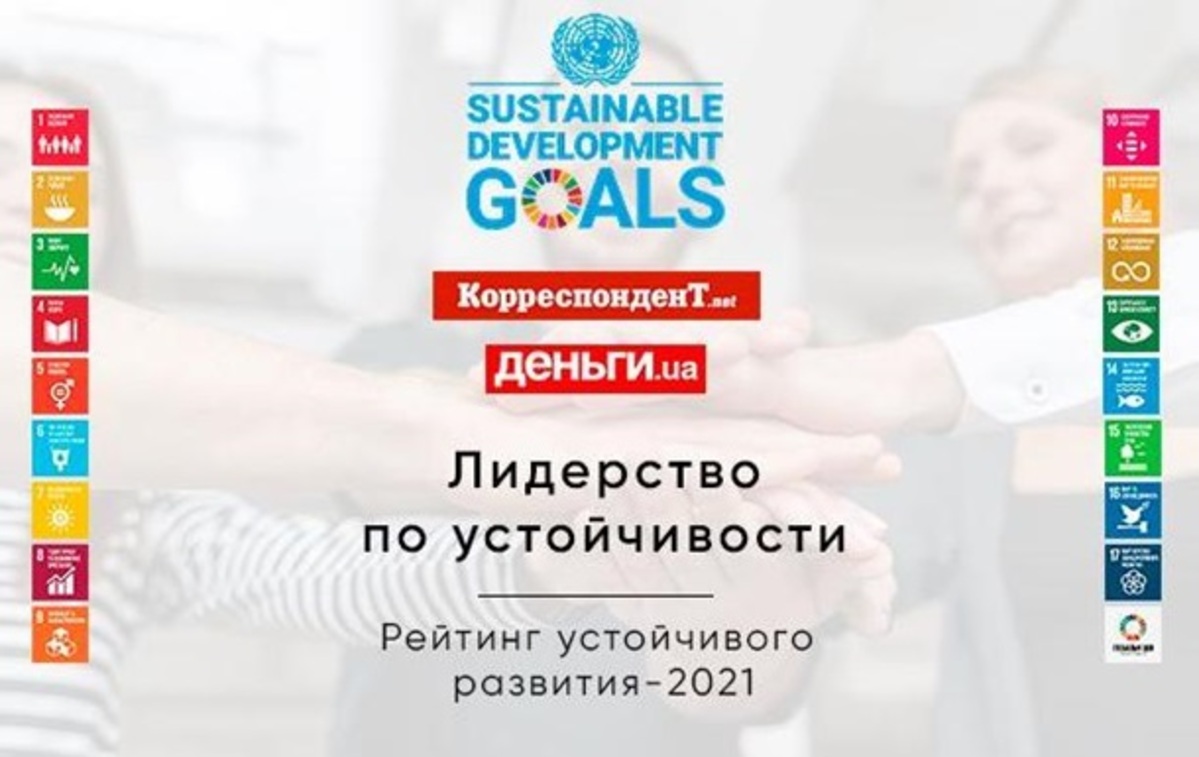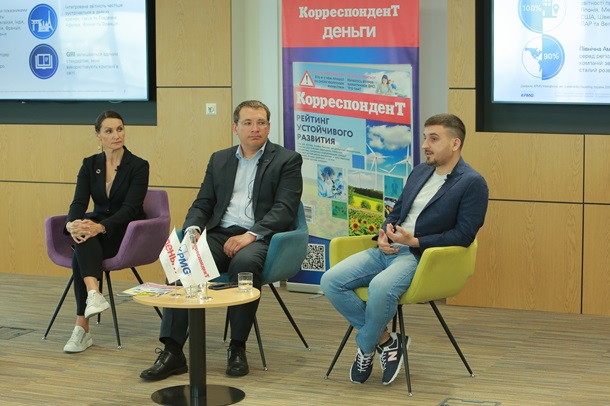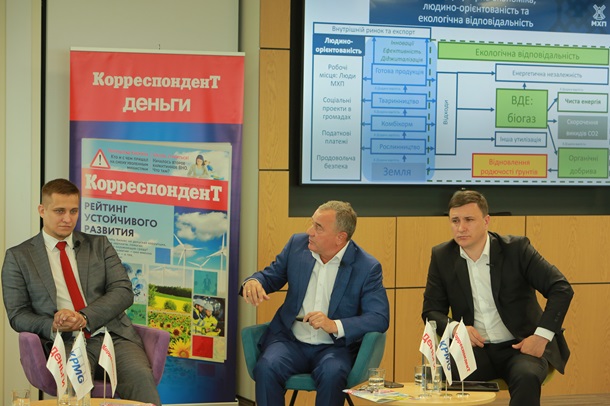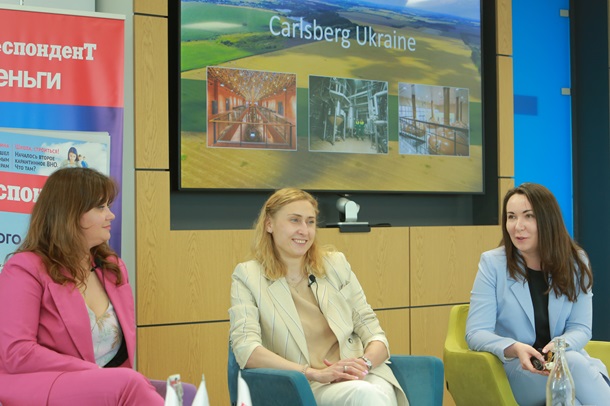
You might wonder why the Sustainable Development Ranking is important. To quote one of the participants, “Those who have strong and long-term goals, live long and prosper.”
Once a business starts setting sustainable development goals while making money, it becomes stronger, more resilient to external challenges, it becomes better in any way possible.
In KPMG’s Ukrainian office, on June 14, we gathered those who entered the to share their experiences and thoughts, to get their impressions of the Ranking, and, finally, to start working on the next one. Such projects should be run one by one with no pause. This ranking was created by the Dengi and the Korrespondent magazines in partnership with the UN Global Compact Network Ukraine.
LEADERS SPEAK

Tetyana Sakharuk, Chief Executive Director – UN Global Compact Ukraine
This is the first Sustainable Development Ranking in our country, and it is quite short. However, it’s just the beginning, a really great beginning of the culture of openness. Because not so long ago, it was absolutely unbelievable that any company would disclose any kind of information. And yet today, together with our partners, we are trying to create a culture that would allow companies to go beyond boundaries and limits. To show their good deeds in the field of ecology, social life, and economics. To show how they create this culture of openness and lead the way.
Andriy Tsymbal, the Managing Partner of KPMG Ukraine
What exactly is sustainable development and ESG right now? Is it the future, modern trend, or something crucial for today’s world? In recent years, big business has been much more active in creating sustainable development programs and releasing non-financial reports. At the same time, these reports are increasingly attracting investors. Today, ESG principles are no longer just a trend but a necessity when assessing the weak and strong sides of a company. Ukrainian business, in its turn, is only at the beginning of its journey. It is just learning to create systemic approaches.
Volodymyr Dedyshyn, Head of the Communications Department of TECHIIA holding
I want to talk a little bit about strategic philanthropy. It is part of our Sustainable Development approach. In short, strategic philanthropy is when a business implements certain social initiatives. And this will benefit stakeholders, society, and the company itself. And for those Ukrainian businesses that diversify, go global, enters new markets, sustainable development should be a business feature that is part of compliance procedures.

Oleksiy Savin, the Director of the Reengineering and Resource Conservation Projects Department at Ukrgasbank
What started as a small project in 2016 is now a strategic financing area for our bank. Now more than 30% of our loan portfolio is made up of green projects. In total, this is more than 660 large and medium-sized projects worth more than UAH 30 billion. And this is just the beginning. Because the International Finance Corporation, which is our partner, estimates the total potential of energy efficiency, sustainable development, and renewable energy projects in Ukraine for the next 10-15 years in over 70 billion euros.
Oleksandr Dombrovsky, the CEO of the Eco-Energy MHP
We have set ourselves a clear goal — to become a carbon-neutral company by 2030. It's not just a task, it's a huge step that we're already taking and a real technology that we're launching. And I would like to say that there are many great projects along the way, that we use as an example. I would like to point out that MHP has been working in the circular economy model for a long time. And you know that in the EU’s green deal, which is quite a heated discussion today, this agreement adopts the circular economy model as one of the key elements.
Oleksiy Nychyporuk, the CEO of Kaparol Ukraine
Let me point the link between today and tomorrow here. If you do not share social responsibility, if you do not care about nature and future generations in your work, then your business is limited in time. Back in 2010, the company owners and management created an independent sustainable development council. In 2012, they joined the UN global initiative. And in 2019, the subsidiary Kaparol Ukraine joined the Global Compact initiative in Ukraine. During this time our work has been subordinated and synchronized with the sustainable development goals.

Victoria Vozniuk, Corporate Affairs Lead at Unilever Ukraine
After 10 years on the market, we analyzed our successes and the areas in which we need to grow. This made us transform our sustainable development plan into a Compass strategy, which now covers three main areas: communities, brands, and companies. We believe that companies that have long-term goals will operate for the long term. Those individuals who also follow the sustainable development goals, will also live and prosper for a long time. Same works for brands. Our statistics show that brands that have sustainable development goals, grow twice as fast. And in 2020, they provided more than half of our turnover.
Eugenia Piddubna, Corporate Communications Director at JSC Farmak
Any business, when scaling, comes to the point that it requires clear standards. This is how compliance standards emerge and are implemented in the company. Business processes should be based on clear and understandable practices. The same applies to sustainable development goals. In order for these goals to be essential for the business, this business should clearly define its purpose and its greatest influence. And this is what we are doing now. We are defining for ourselves who we are as a Ukrainian pharmaceutical company, and what our greatest influence is.
Julia Stelmakh, Senior Corporate Relations Manager, Carlsberg Ukraine
There are four key areas in Carlsberg’s strategy. And they are all correlated with the UN's global goals. These are the areas where the company has the greatest influence and can make its greatest contribution. The first goal is ZERO carbon footprint. It is reflected in production, packaging, shipping, and other processes. The second goal is ZERO irresponsible drinking. The third goal is ZERO water waste. The last, but probably the most important last year, is ZERP accidents culture in terms of people safety.
That is why we created this to help Ukrainian businesses prepare for the new reality. The main purpose of this ranking was to accumulate the best sustainable development strategies and practices and to provide information about the best examples to follow. And not the place in this ranking that is important, but the published information and the very fact of business taking part in this race of openness.
The Korrespondent invited quite a few Ukrainian companies to talk about how they pursue the UN’s sustainable development goals. Of course, we did not try to get information on all 17 goals, because it is both inappropriate and too time-consuming (there would be about 120 questions to answer, and this is quite a lot). But for our companies, there are four to six goals out of these 17 that are relevant today.
Therefore, we asked 10 questions, which, in our opinion, covered the most common and important sustainable development goals.
In the Management cluster, we were interested in three criteria:
- Whether the company has Anti Bribery & Anti Corruption Policies, which we compared to the best practices.
- Where there is an anti-corruption toolkit (anti-corruption knowledge and skills). That would mean that the management is concerned whether employees are provided with knowledge and skills in the field of anti-corruption.
- Gender equality in the company, which is perhaps best demonstrated by the gender structure in the company’s C-level.
In the Social Development cluster we were guided by the following criteria:
- The average wage in the company, not taking into account the wage of the top management. We believe that this criterion is quite powerful. It also illustrates the company's willingness to pay its employees a fair wage and reflects the company's contribution to the development of the business area (because the personal income tax, which is proportional to the salary, mainly finances local budgets).
- Whether there are social projects and which are the most important ones. Mainly on the territories where businesses operate.
- Social program financing priority. We calculated this criterion by comparing such costs with the company's pre-tax income.
In the Ecology cluster, our criteria were similar to Social Development ones — a list of programs and the share of investments in improving the company's environmental position. But we also used the third and fourth criteria — the carbon footprint reduction rate and the amount of environmental taxes paid.
All these questions were answered by 39 companies, although there were more companies that have received our questionnaire. Accordingly, we processed the answers and created a .
Original article on .


